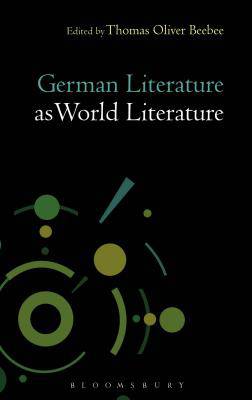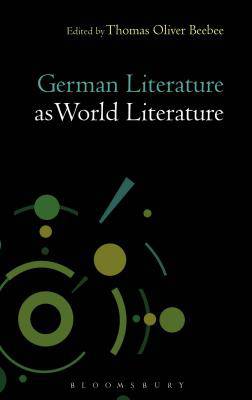
Wil je zeker zijn dat je cadeautjes op tijd onder de kerstboom liggen? Onze winkels ontvangen jou met open armen. Nu met extra openingsuren op zondag!
- Afhalen na 1 uur in een winkel met voorraad
- Gratis thuislevering in België vanaf € 30
- Ruim aanbod met 7 miljoen producten
Wil je zeker zijn dat je cadeautjes op tijd onder de kerstboom liggen? Onze winkels ontvangen jou met open armen. Nu met extra openingsuren op zondag!
- Afhalen na 1 uur in een winkel met voorraad
- Gratis thuislevering in België vanaf € 30
- Ruim aanbod met 7 miljoen producten
Zoeken
German Literature as World Literature
€ 183,45
+ 366 punten
Omschrijving
This new collection investigates German literature in its international dimensions. While no single volume can deal comprehensively with such a vast topic, the nine contributors cover a wide historical range, with a variety of approaches and authors represented. Together, the essays begin to adumbrate the systematic nature of the relations between German national literature and world literature as these have developed through institutions, cultural networks, and individual authors.
In the last two decades, discussions of world literature-literature that resonates beyond its original linguistic and cultural contexts-have come increasingly to the forefront of theoretical investigations of literature. One reason for the explosion of world literature theory, pedagogy and methodology is the difficulty of accomplishing either world literature criticism, or world literary history. The capaciousness, as well as the polylingual and multicultural features of world literature present formidable obstacles to its study, and call for a collaborative approach that conjoins a variety of expertise. To that end, this collection contributes to the critical study of world literature in its textual, institutional, and translatorial reality, while at the same time highlighting a question that has hitherto received insufficient scholarly attention: what is the relation between national and world literatures, or, more specifically, in what senses do national literatures systematically participate in (or resist) world literature?Specificaties
Betrokkenen
- Uitgeverij:
Inhoud
- Aantal bladzijden:
- 232
- Taal:
- Engels
- Reeks:
Eigenschappen
- Productcode (EAN):
- 9781623563912
- Verschijningsdatum:
- 1/07/2014
- Uitvoering:
- Hardcover
- Formaat:
- Genaaid
- Afmetingen:
- 150 mm x 231 mm
- Gewicht:
- 476 g

Alleen bij Standaard Boekhandel
+ 366 punten op je klantenkaart van Standaard Boekhandel
Beoordelingen
We publiceren alleen reviews die voldoen aan de voorwaarden voor reviews. Bekijk onze voorwaarden voor reviews.










